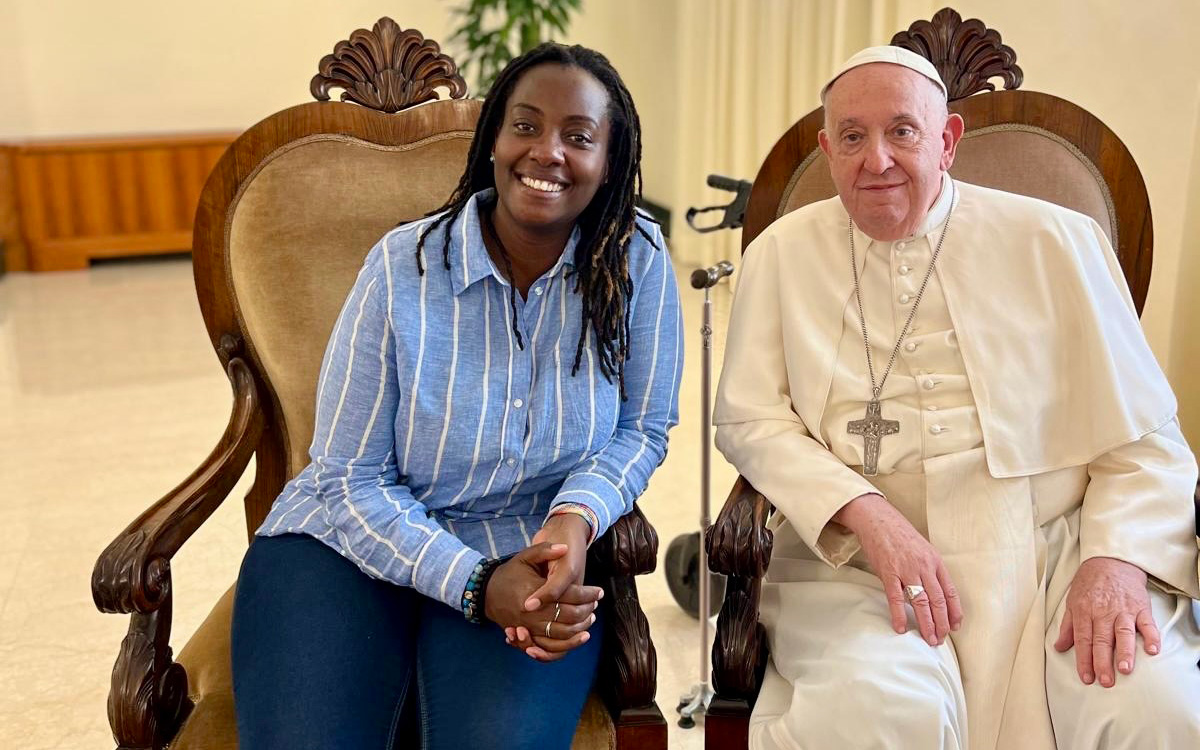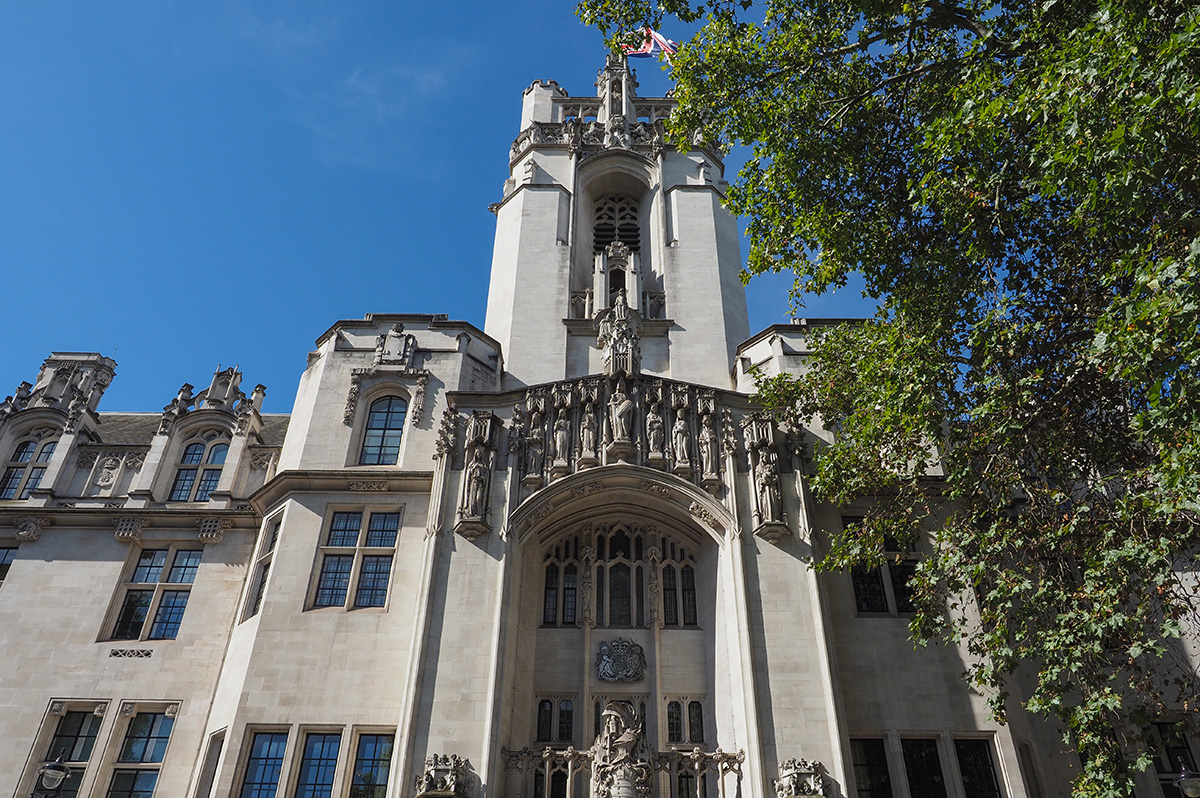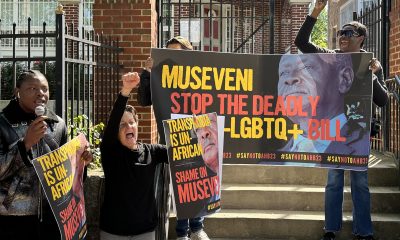Europe
African LGBTQ activists meet with Pope Francis
Pontiff met with Clare Byarugaba from Uganda and Ebenezer Peegah from Ghana

Pope Francis on Tuesday met with two LGBTQ activists from Africa at the Vatican.
Clare Byarugaba of Chapter Four Uganda posted to her X account a picture of her sitting next to Francis. A video that she shared shows Juan Carlos Cruz — a gay Chilean man who is a survivor of clergy sex abuse and a member of a commission that advises Francis on protecting children from pedophile priests — introducing her to the pontiff.
Cruz is also a member of the GLAAD board of directors.
Byarugaba, who also founded PFLAG Uganda, said she was “honored to meet” Francis. She added she briefed him on “the ruinous impact of Uganda’s two in a decade anti-LGBTIQ rights laws,” including the Anti-Homosexuality Act that President Yoweri Museveni signed in 2023, and “the gross human rights violations therein.”
“He reiterated discrimination is a sin and violence against LGBTIQ communities is unacceptable,” said Byarugaba.
The Washington Blade has reached out to Byarugaba for additional comment.
Francis on Tuesday also met with Rightify Ghana Director Ebenezer Peegah.
“With LGBTQI+ criminalization rising in Africa, and Ghana’s anti-LGBTQI+ bill pending, we shared our experiences as queer individuals in Ghana and expressed gratitude to the pope for his progressive stance, especially his opposition to violence and discrimination,” said Rightify Ghana on X. “Pope Francis encouraged us to ‘keep fighting for your rights,’ and that’s exactly what we will do.”
On Tuesday, August 14, 2024, Rightify Ghana’s Director @Ebenezer_Peegah had the honour of meeting Pope Francis @Pontifex at the Vatican.
With LGBTQI+ criminalisation rising in Africa, and Ghana’s anti-LGBTQI+ bill pending, we shared our experiences as queer individuals in.. pic.twitter.com/tYfW1X4W6D
— Rightify Ghana (@RightifyGhana) August 15, 2024
Francis during a Jan. 24, 2023, interview with the Associated Press said homosexuality is not a crime and laws that criminalize it are “unjust.” Francis a few days later reiterated these comments during a press conference on board his plane after it left South Sudan, a country that borders Uganda.
Consensual same-sex sexual relations remain criminalized in South Sudan.
“The criminalization of homosexuality is a problem that cannot be ignored,” Francis told reporters. “Criminalizing people with homosexual tendencies is an injustice.”
Uganda’s Anti-Homosexuality Act, among other things, contains a death penalty provision for “aggravated homosexuality.”
The U.S. after Museveni signed the law imposed visa restrictions on Ugandan officials and removed the country from a program that allows sub-Saharan African countries to trade duty-free with the U.S. The World Bank Group also announced the suspension of new loans to Uganda.
The Ugandan Constitutional Court on April 3 refused to “nullify the Anti-Homosexuality Act in its totality.”
More than a dozen activists appealed the ruling to the country’s Court of Appeal. They filed a second appeal with the Supreme Court on July 11.
Angola, Botswana, Mauritius, and Seychelles are among the countries that have decriminalized consensual same-sex sexual relations over the last decade.
The Namibian government last month appealed a ruling that struck down the country’s apartheid-era sodomy laws.
Burkina Faso’s military government on July 10 announced it plans to recriminalize consensual same-sex sexual relations in the nation. The Ghanaian Supreme Court on July 24 upheld the country’s colonial-era sodomy law.
Ghanaian lawmakers on Feb. 28 approved the Promotion of Proper Human Sexual Rights and Ghanaian Family Values Bill that would, among other things, criminalize allyship. President Nana Akufo-Addo has said he will not sign the bill until the Supreme Court rules on whether it is constitutional or not.
United Kingdom
UK Supreme Court rules legal definition of woman limited to ‘biological women’
Advocacy groups say decision is serious setback for transgender rights

The British Supreme Court on Wednesday ruled the legal definition of a woman is limited to “biological women” and does not include transgender women.
The Equality Act that bans discrimination based on sexual orientation and gender identity took effect in 2010.
Scottish MPs in 2018 passed a bill that sought to increase the number of women on government boards. The Supreme Court ruling notes For Women Scotland — a “feminist voluntary organization which campaigns to strengthen women’s rights and children’s rights in Scotland” — challenged the Scottish government’s decision to include trans women with a Gender Recognition Certificate in its definition of women when it implemented the quota.
Stonewall U.K., a British advocacy group, notes a Gender Recognition Certificate is “a document that allows some trans men and trans women to have the right gender on their birth certificate.”
“We conclude that the guidance issued by the Scottish government is incorrect,” reads the Supreme Court ruling. “A person with a GRC (Gender Recognition Certificate) in the female gender does not come within the definition of ‘woman’ for the purposes of sex discrimination in section 11 of the EA (Equality Act) 2010. That in turn means that the definition of ‘woman’ in section 2 of the 2018 Act, which Scottish ministers accept must bear the same meaning as the term ‘woman’ in section 11 and section 212 of the EA 2010, is limited to biological women and does not include trans women with a GRC.”
The 88-page ruling says trans people “are protected by the indirect discrimination provisions” of the Equality Act, regardless of whether they have a Gender Recognition Certificate.
“Transgender people are also protected from indirect discrimination where they are put at a particular disadvantage which they share with members of their biological sex,” it adds.
Susan Smith, co-founder of For Women Scotland, praised the decision.
“Today the judges have said what we always believed to be the case, that women are protected by their biological sex,” she said, according to the BBC. “Sex is real and women can now feel safe that services and spaces designated for women are for women and we are enormously grateful to the Supreme Court for this ruling.”
Author J.K. Rowling on X said it “took three extraordinary, tenacious Scottish women with an army behind them to get this case heard by the Supreme Court.”
“In winning, they’ve protected the rights of women and girls across the UK,” she added.
It took three extraordinary, tenacious Scottish women with an army behind them to get this case heard by the Supreme Court and, in winning, they’ve protected the rights of women and girls across the UK. @ForWomenScot, I’m so proud to know you 🏴💜🏴💚🏴🤍🏴 https://t.co/JEvcScVVGS
— J.K. Rowling (@jk_rowling) April 16, 2025
Advocacy groups in Scotland and across the U.K. said the ruling is a serious setback for trans rights.
“We are really shocked by today’s Supreme Court decision — which reverses 20 years of understanding on how the law recognizes trans men and women with Gender Recognition Certificates,” said Scottish Trans and the Equality Network in a statement posted to Instagram. “The judgment seems to have totally missed what matters to trans people — that we are able to live our lives, and be recognized, in line with who we truly are.”
Consortium, a network of more than 700 LGBTQ and intersex rights groups from across the U.K., in their own statement said it is “deeply concerned at the widespread, harmful implications of today’s Supreme Court ruling.”
“As LGBT+ organizations across the country, we stand in solidarity with trans, intersex and nonbinary folk as we navigate from here,” said Consortium.
The Supreme Court said its decision can be appealed.
Hungary
Hungarian MPs amend constitution to ban public LGBTQ events
Viktor Orbán’s government spearheaded amendment

Hungarian MPs on Monday voted to amend their country’s constitution to ban public LGBTQ events.
The vote took place less than a month after lawmakers banned Pride events and gave authorities the green light to use facial recognition technology to identify those who participate in them.
The Associated Press notes MPs approved the constitutional amendment — which Prime Minister Viktor Orbán’s Fidesz-KDNP coalition government proposed — by a 140-21 vote margin. Authorities before the vote removed a group of protesters who tried to block the entrance to a parliament parking garage.
Orbán’s government over the last decade has moved to curtail LGBTQ and intersex rights in Hungary.
A law that bans legal recognition of transgender and intersex people took effect in 2020. Hungarian MPs that year also effectively banned same-sex couples from adopting children and defined marriage in the constitution as between a man and a woman.
An anti-LGBTQ propaganda law took effect in 2021. The European Commission sued Hungary, which is a member of the European Union, over it.
MPs in 2023 approved the “snitch on your gay neighbor” bill that would have allowed Hungarians to anonymously report same-sex couples who are raising children. The Budapest Metropolitan Government Office in 2023 fined Lira Konyv, the country’s second-largest bookstore chain, 12 million forints ($33,115.76), for selling copies of British author Alice Oseman’s “Heartstopper.”
Former U.S. Ambassador to Hungary David Pressman, who is gay, participated in the Budapest Pride march in 2024 and 2023. Pressman was also a vocal critic of Hungary’s anti-LGBTQ crackdown.
The Washington Blade has reached out to Budapest Pride for comment on the constitutional amendment.
Denmark
Denmark issues US travel advisory for transgender people
Federal government only recognizes two genders: Male and female

Denmark is the latest country to issue a travel advisory for transgender people who plan to visit the U.S.
“When applying for an ESTA (Electronic System for Travel Authorization) or visa to the United States, there are two gender designations to choose from: Male or female,” reads the travel advisory the Danish Foreign Affairs Ministry issued on Friday, according to the Associated Press. “If you have the gender designation ‘X’ in your passport, or you have changed your gender, it is recommended that you contact the U.S. Embassy prior to travel for guidance on how to proceed.”
President Donald Trump shortly after he took office on Jan. 20 issued an executive order that bans the State Department from issuing passports with “X” gender markers. Secretary of State Marco Rubio in response to directive ordered State Department personnel to “suspend any application requesting an ‘X’ sex marker and do not take any further action pending additional guidance from the department.”
Trump on Feb. 5 issued another executive order that bans trans women and girls from female sports teams. The Guardian reported Rubio later instructed American consular officials to deny visas in “cases where applicants are suspected of misrepresenting their purpose of travel or sex.”
The German government earlier this month issued a travel advisory for trans and nonbinary people who are planning to visit the U.S. The AP notes Finland followed suit.
WorldPride is scheduled to take place in D.C. from May 17-June 8.
InterPride, the organization that coordinates WorldPride events, on March 12 issued its own travel advisory for trans and nonbinary people who want to travel to the U.S.
“Due to an executive order issued by the U.S. president on Jan. 20, all travelers must select either ‘male’ or ‘female’ when applying for entry or visas. The gender listed at birth will be considered valid,” reads the advisory. “If your passport has ‘X’ as a gender marker or differs from your birth-assigned gender, we strongly recommend contacting the U.S. diplomatic mission before traveling to confirm entry requirements.”
The Capital Pride Alliance is the local WorldPride host. Capital Pride said it is working on the guide mentioned in the InterPride advisory.
The guide has yet to be released.
The African Human Rights Coalition, a group that promotes LGBTQ rights in Africa, last week called for a boycott of WorldPride, noting an “antagonistic fascist regime which presents distinct dangers to foreign LGBTQI+ attendees” now governs the U.S. Egale Canada, one of Canada’s largest LGBTQ advocacy organizations, in February announced its members will not attend WorldPride and any other event in the U.S. because of the Trump-Vance administration’s policies.
-

 The White House5 days ago
The White House5 days agoWhite House does not ‘respond’ to reporters’ requests with pronouns included
-

 District of Columbia2 days ago
District of Columbia2 days agoReenactment of 1965 gay rights protest at White House set for April 17
-

 Hungary2 days ago
Hungary2 days agoHungarian MPs amend constitution to ban public LGBTQ events
-

 Maryland2 days ago
Maryland2 days agoFreeState Justice: Transgender activist ‘hijacked’ Moore’s Transgender Day of Visibility event












